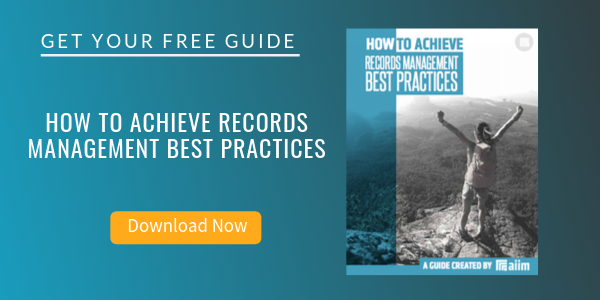
What’s Wrong with Records Management?
Electronic Records Management (ERM)
There is something very wrong with how organizations manage information of business or legal value. Most ECM or ERM systems are not deployed across an enterprise; they are usually implemented in large and regulated industries to improve the control of information in a specific department or process.
Why do so few business executives care about records management? The answer is complex, but here are a few thoughts.
Market Trends in Records Management
- Content of business or legal value is created by knowledge workers 24-7
- This content is created on a variety of corporate and personal laptops and smartphones
- This content is often stored on external servers and social media managed by 3rd parties
- Volume is increasing exponentially, and records are increasingly created in conversations in instant messages, tweets, chat rooms, discussion forums, etc.
- It is now cheaper to store electronic content than to get rid of it -- or at least that is the conventional wisdom -- which is why many organizations decide to keep most of it
- New communication channels and devices are introduced by knowledge workers leveraging consumer IT since enterprise IT is considered slow and tedious
Consequences
The above trends are a paradigm shift for records management. Principles from “paper-based” records management where all staff are accountable for identifying, capturing, and classifying electronic information of “administrative, operational, fiscal, legal or evidential value” (according to ISO15489-1) does not work. Volume kills the manual processes, and organization can’t specify how information is stored or managed on social media sites like Facebook, Twitter, and YouTube.
The Result is a Digital Landfill
- Most shared drives and SharePoint sites look like a digital landfill with little or no control
- 47% rate Office docs “Somewhat unmanaged or very unmanaged.”
- 52% rate Emails “Somewhat unmanaged or very unmanaged.”
- 72% rate Blogs and wikis “Somewhat unmanaged or very unmanaged.”
- 74% rate Instant messages “Somewhat unmanaged or very unmanaged.”
And if we look at email in more detail:
- 45% of organizations do not have a policy on Outlook “Archive settings,” so most users will likely create .pst archive files on local drives.
- 34% of organizations never delete emails, 31% have no policy, 8% delete when running out of storage space, 27% delete after 1- 24 months
- 33% of organizations have no policy to deal with legal discovery, 40% would likely have to search back-up tapes, and 23% feel they would have gaps from deleted emails.
And if the electronic information has legal value:
- 38% often print newly generated office documents and file them as paper records since they DO NOT have a good solution to manage electronic records.
- 43% often print important emails and file them as paper records
- 33% often print anything that may need to be accessed for audit
Applying paper-based records management principles to electronic records feels like we are asking a blacksmith to fix our sports car. So, what do we need to do to move forward? How do we move beyond the paper paradigm for records management?
About John Mancini
John Mancini is the President of Content Results, LLC and the Past President of AIIM. He is a well-known author, speaker, and advisor on information management, digital transformation and intelligent automation. John is a frequent keynote speaker and author of more than 30 eBooks on a variety of topics. He can be found on Twitter, LinkedIn and Facebook as jmancini77. Recent keynote topics include: The Stairway to Digital Transformation Navigating Disruptive Waters — 4 Things You Need to Know to Build Your Digital Transformation Strategy Getting Ahead of the Digital Transformation Curve Viewing Information Management Through a New Lens Digital Disruption: 6 Strategies to Avoid Being “Blockbustered” Specialties: Keynote speaker and writer on AI, RPA, intelligent Information Management, Intelligent Automation and Digital Transformation. Consensus-building with Boards to create strategic focus, action, and accountability. Extensive public speaking and public relations work Conversant and experienced in major technology issues and trends. Expert on inbound and content marketing, particularly in an association environment and on the Hubspot platform. John is a Phi Beta Kappa graduate of the College of William and Mary, and holds an M.A. in Public Policy from the Woodrow Wilson School at Princeton University.



